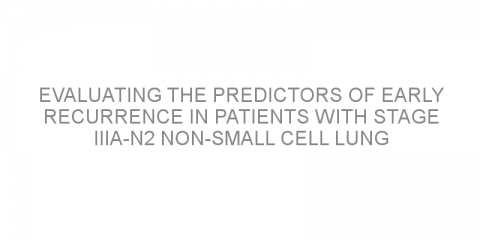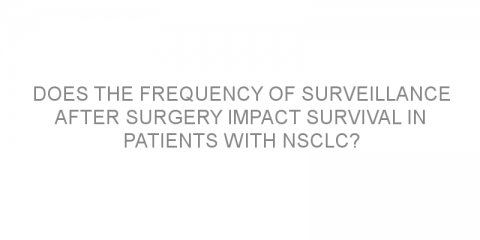In a nutshell The study aimed to investigate the effectiveness and safety of atezolizumab (Tecentriq) versus best supportive care after chemotherapy in patients with resected early-stage non-small-cell lung cancer (NSCLC). The study showed atezolizumab is effective and has better outcomes than best supportive in these...
Read MoreTreatment(s) already received-Surgical removal of the tumor Posts on Medivizor
Evaluating the predictors of early recurrence in patients with stage IIIA-N2 non-small cell lung cancer after surgery.
In a nutshell This study evaluated the predictors of early recurrence in patients with stage IIIA-N2 non-small cell lung cancer (NSCLC) after surgery. The data showed that early recurrence after surgery was associated with poor survival outcomes in patients with stage IIIA-N2 NSCLC. Smoking history, large tumor size, increased lymph node ratio, and...
Read MoreHow effective is postoperative radiotherapy after partial lung removal?
In a nutshell This study investigated if postoperative radiotherapy (PORT) is effective in non-small cell lung cancer (NSCLC) after pneumonectomy (PMT; lung surgery). They found that PORT improved survival and was well tolerated in these patients. Some background Non-small cell lung cancer (NSCLC) is the most common type of lung cancer....
Read MoreDoes the frequency of surveillance after surgery impact survival in patients with NSCLC?
In a nutshell This study looked at the frequency of follow-ups after surgical treatment in patients with non-small-cell lung cancer and whether it had an effect on survival. The study concluded that more frequent surveillance was not linked to improved survival. Some background Surveillance during the post-treatment stage of cancer is a critical...
Read MoreComparing gene-targeting therapy to standard chemotherapy in patients with early stage NSCLC
In a nutshell This study compared gefitinib (Iressa) to cisplatin (Platinol)-based chemotherapy for treating patients with EGFR-mutation positive, early stage non-small-cell lung cancer, after surgery. The authors concluded that while treatment with gefitinib improved disease free survival compared to chemotherapy, they were unable to calculate overall...
Read MoreLooking for non-small cell lung cancer patients to study the effectiveness of a nivolumab treatment after surgery and chemotherapy
In a nutshell This multicenter phase 3 clinical trial will test the effectiveness of nivolumab (Opdivo) after surgery and chemotherapy in stage 1b to 3a non-small cell lung cancer (NSCLC). The primary outcome will be measured by the length of time the patient survives without signs of the cancer and the overall survival rate for up to 10...
Read MoreDoes your age alter the effectiveness of chemotherapy after surgery?
In a nutshell This study looked at whether a person’s age can alter the effectiveness of chemotherapy for non-small cell lung cancer that has been surgically removed. Some background One of the most common treatment options for patients with non-small cell lung cancer is surgery. Despite the removal of their tumors, it is often found that...
Read MorePaclitaxel-based chemo-radiotherapy in NSCLC patients with tumor following surgery
In a nutshell The authors assessed the effectiveness of paclitaxel (Taxol)-based chemo-radiotherapy (combination of chemotherapy and radiation therapy) in non-small cell lung cancer patients (NSCLC) with presence of tumor after surgery. Some background The primary treatment for NSCLC is the surgical removal of the affected lobe of...
Read MoreBlood protein levels could predict benefit of gefitinib in patients with advanced disease
In a nutshell This study investigated using levels of the proteins MUC1 and VEGF to predict the benefit of gefitinib in patients with advanced NSCLC. Some background Non small-cell lung cancer (NSCLC) is a common type of lung cancer that can be difficult to treat. 65-75% of cases are presented at an advanced stage. Chemotherapy is often...
Read MoreHaemoptysis predicts survival and recurrence
In a nutshell This study investigated the prognostic role of haemoptysis in patient diagnosed with adenocarcinoma of lung and cured after surgery. Some background Haemoptysis, or bloody sputum, is a common symptom of lung cancer. Haemoptysis is thought to occur due to the invasion of the cancer into the small blood vessels of the lung. Therefore,...
Read More











